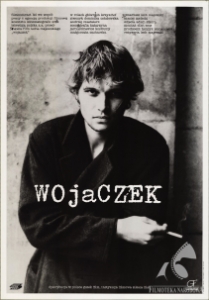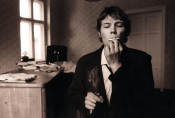WOJACZEK [1999]

year:
- 1999
release date:
- 5 XI 1999
runtime:
- 89 min
directed by:
- Lech Majewski
written by:
- Lech Majewski, Maciej Melecki
director of photography:
- Adam Sikora
cast:
- Krzysztof Siwczyk [Rafał Wojaczek], Dominika Ostałowska [Mała], Andrzej Mastalerz [Wiktor Sierpień], Elżbieta Okupska [Hornacka], Mirosława Lombardo [Rafał’s mother], Jan Bógdoł [Rafał’s father], Andrzej Wojaczek [a neurologist], Jan Skrzek [a gravedigger], Robert Gawliński [Edward Stachura], Janusz Styczeń [as himself], Paweł Fesołowicz [Ciechoński], Andrzej Hudziak [Zatyczka], Andrzej Chłapecki [an announcer]
edited by:
- Eliot Ems
music by:
- Lech Majewski
production design:
- Katarzyna Jarnuszkiewicz
produced by:
- Filmcontract Ltd.
producer:
- Henryk Romanowski
awards:
-
• Lubusz Film Summer Łagów 1999 : Bronze Grape
• Polish Feature Film Festival Gdynia 1999: best director award for Lech Majewski
• Independent Film Festival Barcelona (Spain) 2000 : Don Quixote
• Festival of European Cinema Coroto (Spain ) 2000 Grand Prix
• European Film Award 2000: nomination for Best Actor in Europe for Krzysztof Siwczyk
• Polish Film Award Eagle 2000: nominations for best picture, best director , best screenplay , best cinematography, best set design, best producer, best female performance in a leading role
• Tarnów Film Award 2000: Bronze Leliwita Statuette − Main Prize , Silver Leliwita Statuette − Special Award for Adam Sikora
• IFF Trencianske Teplice (Slovakia) 2000: Gold Key and Gold Key for Adam Sikora
• National Festival of Film Prowincjonalia Września 2000: Johnnie the Waterman for best actor for Krzysztof Siwczyk , Johnnie the Waterman for cinematography for Adam Sikora, Journalists’ Award for Adam Sikora
About the film
Lech Majewski's film is a loose reconstruction of the last days of Rafal Wojaczek, the "accursed poet", who, in 1971 in Wrocław, committed suicide at the age of 26. This black-and-white film consists of several sequences re-enacting the suffocating, hopeless atmosphere of the late 1960s in the small Silesian town of Mikołowo. The poet’s rebellion against reality is expressed through self-destruction. The first scene, when he exits the restaurant through the window, tells the viewer all about our hero’s extreme way of life. Wojaczek tries to kill himself with gas, but his father's untimely return thwarts his intention. He goes to the cemetery where his sister is buried (she died at the age of 6), gets into a freshly dug grave, and asks the gravedigger to cover him with dirt. He visits the hospital where his fiancée Teresa works. While they are making love, Rafał recites a poem. The erotic act and the act of creation are one thing for him. While visiting the alcoholic poet, Wiktor, Rafał and his friend lick vodka straight from the floor when the dropped bottle breaks. At a poetry reading, he meets the already famous poets − Edward Stachura and Ryszard “Bruno” Milczewski. When he is taken to the hospital after another "exit through the glass", he tells Teresa that he does not want to bring her any more torment. Soon after, he takes a lethal dose of sleeping pills.
The film by Lech Majewski is an impressive work with a coherent artistic vision and outstanding performances from the lead actors.
The film features many people who knew Wojaczek personally, including his brother Andrzej Wojaczek, Teresa Ziomber − the poet’s great love, or Andrzej Styczeń − his friend. Instead of a professional actor, it was the poet, Krzysztof Siwczyk, who was cast as Wojaczek. The drama of the poet is set against the background of the hopeless reality of communist Poland, reconstructed with great attention to detail. The creators wanted to get closer to the mystery of the extraordinary personality of this artist and his suicide.
Jan Słodowski, Leksykon polskich filmów fabularnych, Warszawa 1996




